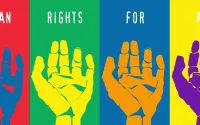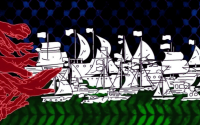In the November elections, Americans rejected President Bush's war policy in the Middle East. Recent polls show a majority want US troops out of Iraq by the end of 2007. In a Newsweek poll in October, a majority opposed US air strikes against Iran, even though the question was asked in a way that might have been expected to draw a positive response: do you support "air strikes against military targets and suspected nuclear sites in Iran" if Iran "continues its efforts to develop nuclear weapons" (so far the claim that Iran is trying to develop nuclear weapons remains an unproven allegation.)
But the Bush Administration seems to think majority sentiments against war do not matter. The White House wants to increase US troop levels in Iraq, despite opposition from the Joint Chiefs of Staff. It is dangerously increasing its military threats against Iran by sending more warships to the Persian Gulf.
And now, the Washington Post reported this week, the administration has given a "green light" for Ethiopia to send troops into Somalia to make war with the Islamic Courts Union (ICU). The ICU recently gained country of nearly the entire country, including the capital, a unification that has not been realized in the troubled country since a dictator was overthrown in 1991. Former State Department official John Prendergast says US support for Ethiopia's military incursion has "incalculably strengthened" the Courts' appeal to Somali nationalism.
The Post reports a widespread view in Ethiopia's capital that Prime Minister Meles is using the conflict in Somalia to distract people from internal problems and to justify further repression of opposition groups. Ethiopian opponents of war say Meles is playing up the claim that there are al-Qaeda operatives within the ICU to maintain support of the US, which relies on a steady flow of Ethiopian intelligence some regional analysts say is of dubious value.
Indeed, even Director of National Intelligence John Negroponte has expressed skepticism about the claim that the ICU is directed by Al Qaeda.
But that hasn't stopped the Bush Administration from supporting war in Somalia, which occupies a strategic geographic position along the southern approach to the Suez Canal.
Until this week, the escalating conflict in Somalia had not drawn much attention in the US press. If the situation is allowed to spin out of control, yet another civil war could be added to the list fostered by the Bush Administration. It is not too late to turn back; the European Union is facilitating peace talks between the Islamic Courts Union and the US-backed government in Somalia.
Residents of Somalia and Ethiopia have suffered terribly from war. The least the U.S. could do would be not to promote another one. Congress needs to speak up and check the administration. A recent attempt in Congress to sanction the Ethiopian government for widespread human rights abuses failed reportedly after former Republican House leader Dick Armey, lobbying on behalf of the Ethiopian government, argued that the US needs Ethiopia in order to fight terrorism.
Congressional representatives need to hear from their consituents that we don't want the U.S. to be responsible for another war. (At Just Foreign Policy, we have set up a website making it easy to write your representatives today.)
As the new Congress prepares to take its seats, we stand at an important juncture where the newly empowered Democrats and their Republican counterparts will either heed the message of the recent election and promote peace, or democracy will be betrayed for continued war policies. Somalia joins Iraq, Iran and Afghanistan as an important test of the strength and respect for American democracy.
Bob Naiman is national coordinator and Patrick McElwee is an organizer with Just Foreign Policy (www.justforeignpolicy.org).
http://www.zmag.org/content/showarticle.cfm?SectionID=11&ItemID=11703






